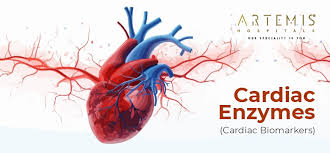
cardiac enzyme
Causes of Changes in Heart Enzyme Levels
The human heart operates according to a clear and precise system, supplying the body’s systems with the blood they need to function, thus giving life. Just as the heart’s function is highly precise and regular, so is everything that comprises the heart.
The heart is not just a simple organ; it contains numerous substances and compounds that are formed within it. Many complex chemical reactions occur within it, essential for its function. Any disruption to these reactions poses a risk to the heart. Any excess or deficiency in these substances and compounds also harms the heart.
One of the most important components and substances contained in the heart are enzymes. Enzymes are essential for the heart to function efficiently and accurately. Cardiac enzymes are proteins that contribute to many reactions within the heart, without becoming involved or interfering with the reactions. In other words, the role of the enzymes is to assist in the reactions, but their role stops there and they do not interfere further.
Cardiac enzymes also provide the appropriate environment for the heart’s function and the interaction of other substances within it. Enzymes are also present in cardiac tissue at a specific level, meaning that the heart itself secretes them.
High levels of cardiac enzymes are a symptom of some heart diseases, such as angina, heart failure, and heart attacks. Doctors consider cardiac enzymes not only to assist the heart, but also to be a contributing factor. Through enzyme levels, doctors can determine the health of the heart. A healthy heart does not experience any enzyme imbalances. However, in the case of any defect or heart disease, the enzyme levels in the heart are disturbed, either by increasing or decreasing them. Therefore, cardiac enzyme levels are essential for doctors. When a doctor suspects a specific heart disease, they will conduct a cardiac enzyme test to determine whether the condition is present. Furthermore, each enzyme level may indicate the presence of a disease or problem with the heart. Increased or decreased cardiac enzyme levels are simply a symptom of another heart disease.
Causes of altered cardiac enzyme levels:
1 – Myocardial infarction.
2 – Heart failure.
3 – The onset of a heart attack.
4 – The onset of angina.
5 – Myocarditis.
6 – A defect in the secretion of cardiac enzymes.
7 – Heart palpitations.
Cardiac enzyme analysis and its importance: A cardiac enzyme test shows the concentration of enzymes in the heart, revealing any abnormalities in this ratio. As we mentioned, any abnormality in this ratio is an indicator of heart disease. The symptoms of heart disease overlap and are very similar to each other, so the test must be performed to provide conclusive evidence of the presence or absence of the disease.
However, sometimes the doctor may be forced not to test the heart enzymes, if the patient suffers from a disease that can affect the results of the enzyme test, making it inaccurate or completely incorrect. Examples of these diseases are endocrine diseases and strokes. In particular, the results of the enzyme test appear incorrect in those who suffer from strokes.








